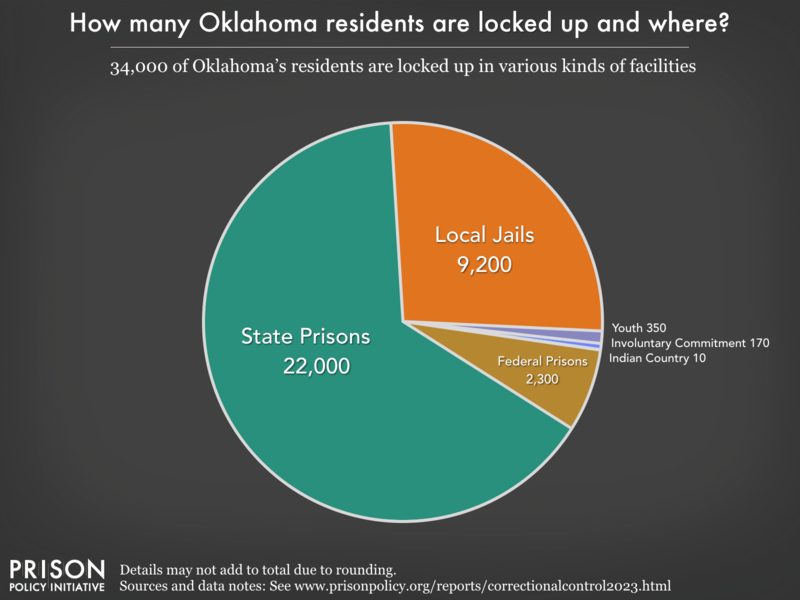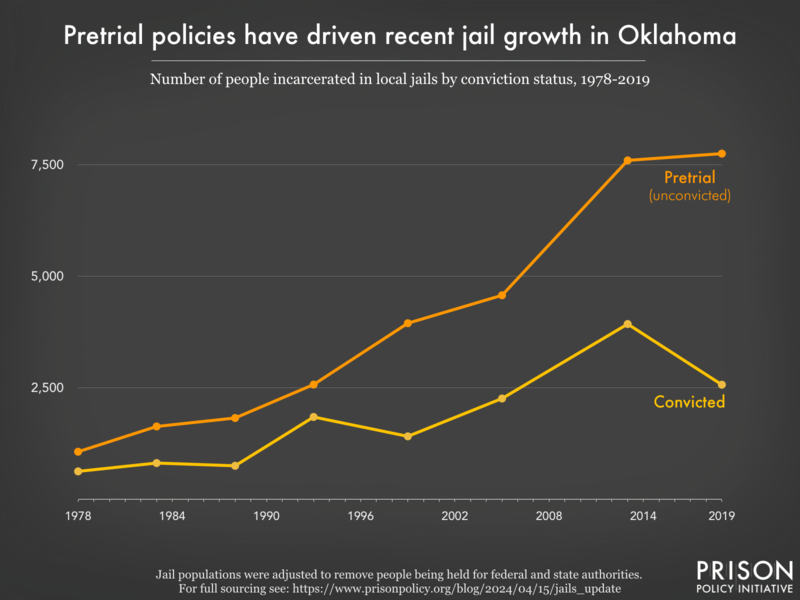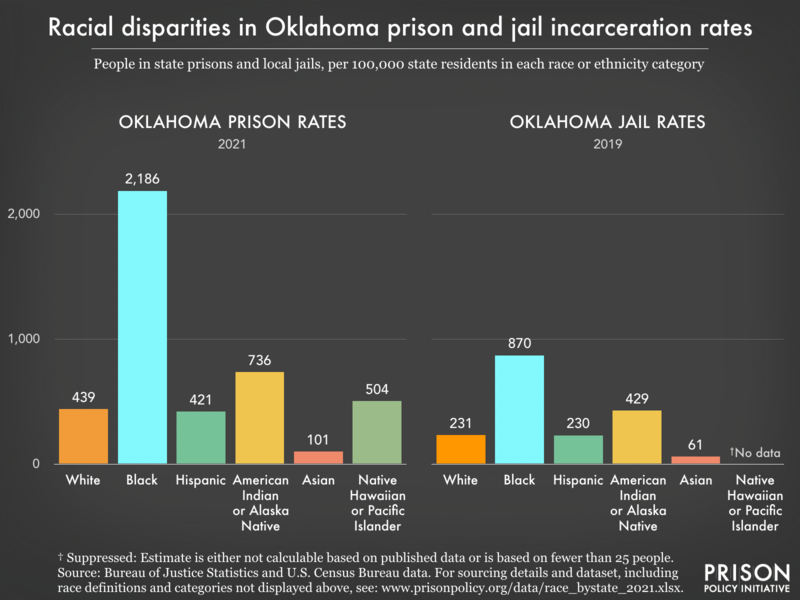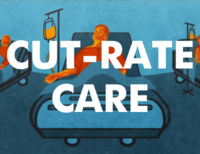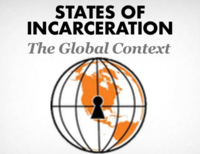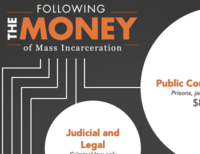Oklahoma profile
Oklahoma has an incarceration rate of 905 per 100,000 people (including prisons, jails, immigration detention, and juvenile justice facilities), meaning that it locks up a higher percentage of its people than any independent democratic country on earth. Read on to learn more about who is incarcerated in Oklahoma and why.
34,000 people from Oklahoma are behind bars
Additionally, the number of people impacted by county and city jails in Oklahoma is much larger than the graph above would suggest, because people cycle through local jails relatively quickly. Each year, at least 96,000 different people are booked into local jails in Oklahoma.
Rates of imprisonment have grown dramatically in the last 40 years
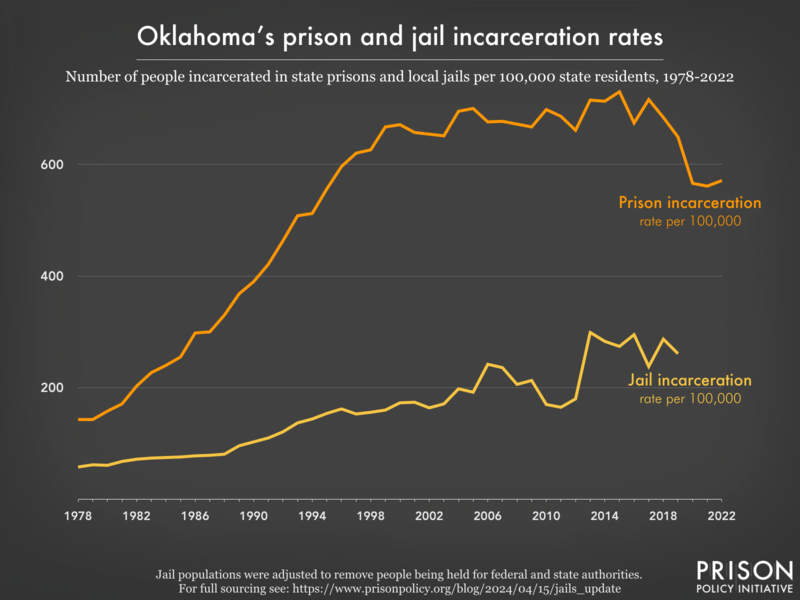
- total numbers rather than rates.
- Women’s prisons: Incarceration Rates | Total Population
- Men’s prisons: Incarceration Rates | Total Population
Today, Oklahoma’s incarceration rates stand out internationally

People of color are overrepresented in prisons and jails
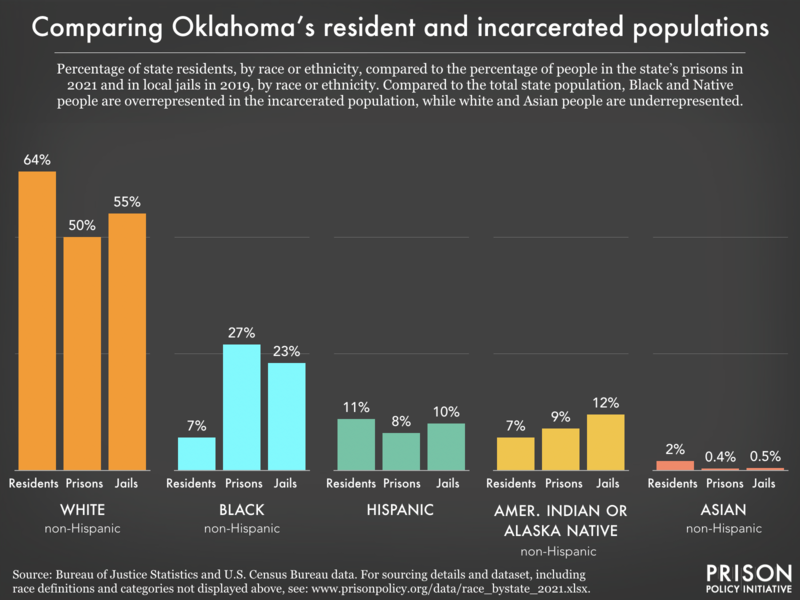
Oklahoma's criminal justice system is more than just its prisons and jails
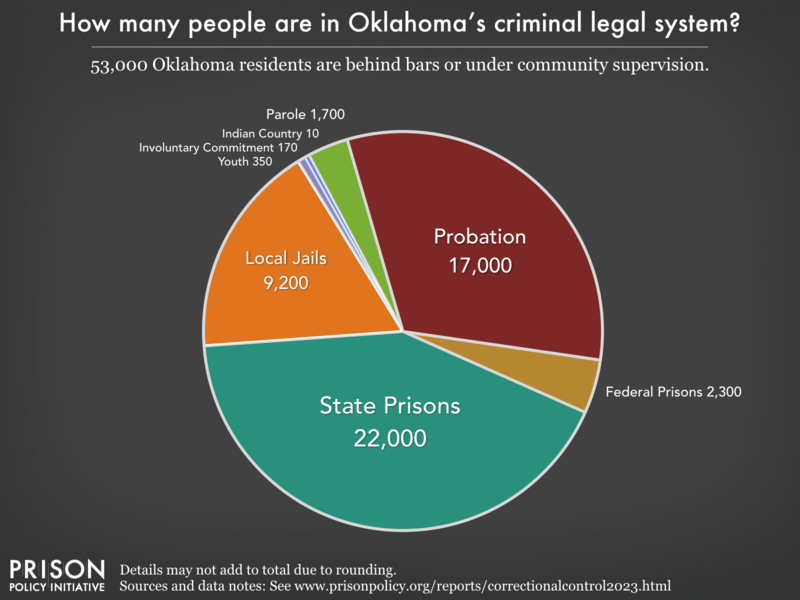
Reports and briefings about Oklahoma's criminal legal system:
Filter to show
- Oklahoma makes medications for opioid use disorder available in some of its prisons. Why is getting treatment for substance use disorders so difficult across the US carceral system?
- Oklahoma decreased its prison population during the pandemic and continued to cut its prison population between 2021 and 2023.
- People on probation in Oklahoma are saddled with onerous rules and conditions they must follow every day or risk incarceration.
- Prisons in Oklahoma have tablets, but they may be being used to restrict incarcerated people’s access to books and sap them of the little money they have.
- With an incarceration rate of 905 per 100,000 residents, Oklahoma locks up a higher percentage of its people than any independent democratic country on earth.
- After the Dobbs’ decision, striking down Roe v. Wade, Oklahoma totally banned abortion, putting access to the service effectively out of reach for the 5,424 women on probation or parole in the state who also face travel restrictions.
- Prisons in Oklahoma force incarcerated people and their families — some of the most vulnerable members of society — to subsidize mass incarceration.
- 75% of people in Oklahoma jails have not been convicted of a crime, meaning they're legally innocent. There are simple steps the state can take to reduce this number. Why isn't it?
- Oklahoma releases roughly 160,559 men and 56,316 women from its prisons and jails each year. What is it doing to support them upon reentry?
- Oklahoma is home to one of the worst prison gerrymanders in the nation.
- People on parole in Oklahoma can be sent back to prison for "associating" with anyone who has a felony or misdemeanor conviction — even loved ones who are trying to support them
- Black people in Oklahoma are incarcerated at a rate 5 times higher than white people.
- Oklahoma's choice to criminalize "failure to appear" may be hurting public safety
- The cost of incarcerating older people is incredibly high, and their risk of reincarceration is incredibly low, yet 13% of people in Oklahoma prisons are over the age of 55. Why is the state keeping so many older people locked up?
- Oklahoma makes it difficult or even risky for incarcerated journalists to tell their stories.
- In Oklahoma, 34,000 people are incarcerated and another 18,700 are on probation or parole.
- Oklahoma charges up to 25¢ for an e-message to or from prison.
- Jails in Oklahoma charge up to $3.15 for a 15-minute phone call, reaping profits for companies, while prisons charge $2.10 for a 15-minute call.
- Bail companies in Oklahoma have a track record of avoiding accountability, our report All Profit, No Risk and review of state-by-state evidence show
- How the end of Roe v. Wade will impact the 5,575 women on probation and parole in Oklahoma
- Oklahoma suspended its $4 medical copays in prisons at the beginning of the pandemic for flu related medical visits — It should eliminate them entirely.
- People in Oklahoma prisons with more than $10.50 in their account must pay for hygiene items and other basics.
- Oklahoma prisons charge families up to a 20% fee to transfer money to an incarcerated loved one.
- We gave Oklahoma a failing grade in September 2021 for its response to the coronavirus in prisons.
- Oklahoma hurts jury diversity by excluding people with felony records
- How many COVID-19 cases in Oklahoma communities can be linked to outbreaks in correctional facilities? (data from our report Mass Incarceration, COVID-19, and Community Spread)
- We graded the parole release systems of all 50 states - Oklahoma gets an F
- New data: Low incomes — but high fees — for people on probation in Oklahoma
- Oklahoma incarcerates women at a rate of 281 per 100,000 residents — higher than any democratic country on earth.
- People in Oklahoma prisons earn as little as 5¢ an hour for their work.
- Prison gerrymandering finally solved in McAlester, Okla.
- Accidental prison gerrymandering almost solved in McAlester, Okla.
- Importing Constituents: Prisoners and Political Clout in Oklahoma
Other resources
- Research on Oklahoma in our Research Library
Events
- April 15-17, 2025:
Sarah Staudt, our Director of Policy and Advocacy, will be attending the MacArthur Safety and Justice Challenge Network Meeting from April 15-17 in Chicago. Drop her a line if you’d like to meet up!
Not near you?
Invite us to your city, college or organization.
